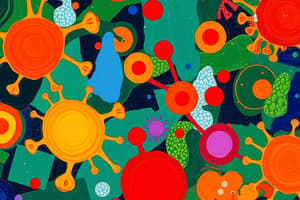Podcast
Questions and Answers
What are cytokines and what is their function?
What are cytokines and what is their function?
Cytokines are low molecular weight proteins or small peptide molecules that transmit information between cells and have immune regulatory and effector functions.
What are the different types of cytokines and what are their sources and functions?
What are the different types of cytokines and what are their sources and functions?
Cytokines can be classified into different types based on their source and function. Interleukins are mainly produced by lymphocytes and macrophages and are involved in immune response and inflammation. Interferons are mainly produced by virus-infected cells and have antiviral, antitumor, and immune regulatory effects. Tumor necrosis factor is mainly produced by macrophages and has effects such as killing tumor cells, activating endothelial cells, and inducing inflammation. Colony stimulating factors are mainly produced by endothelial cells, fibroblasts, and macrophages and promote the proliferation and differentiation of hematopoietic stem cells. Transforming growth factor is mainly produced by platelets, fibroblasts, and macrophages and is involved in tissue repair, fibrosis, and immune suppression. Chemokines are mainly produced by endothelial cells, fibroblasts, and macrophages and induce the migration of white blood cells to inflammatory sites.
Which cells are capable of secreting cytokines?
Which cells are capable of secreting cytokines?
Various cells such as lymphocytes, macrophages, and endothelial cells are capable of secreting cytokines.
Flashcards are hidden until you start studying
Study Notes
- Cytokines are low molecular weight proteins or small peptide molecules that transmit information between cells and have immune regulatory and effector functions.
- Cytokines can be secreted by various cells such as lymphocytes, macrophages, and endothelial cells.
- Cytokines can be classified into different types based on their source and function.
- Interleukins are mainly produced by lymphocytes and macrophages and are involved in immune response and inflammation.
- Interferons are mainly produced by virus-infected cells and have antiviral, antitumor, and immune regulatory effects.
- Tumor necrosis factor is mainly produced by macrophages and has effects such as killing tumor cells, activating endothelial cells, and inducing inflammation.
- Colony stimulating factors are mainly produced by endothelial cells, fibroblasts, and macrophages and promote the proliferation and differentiation of hematopoietic stem cells.
- Transforming growth factor is mainly produced by platelets, fibroblasts, and macrophages and is involved in tissue repair, fibrosis, and immune suppression.
- Chemokines are mainly produced by endothelial cells, fibroblasts, and macrophages and induce the migration of white blood cells to inflammatory sites.
Studying That Suits You
Use AI to generate personalized quizzes and flashcards to suit your learning preferences.




